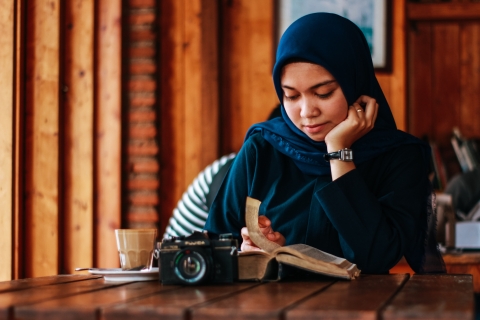
Subtle, hidden and everyday acts of resistance and defiance by people with limited resources could have an impact on markets in societies where state and religion is all-powerful.
These are the key findings of a new study, led by the University of Portsmouth, which shows consumers and individuals can help markets to evolve in societies where they cannot freely and openly participate in them.
The research, published in the Journal of Business Research, found specific forms of behaviour that helped individuals resist strict rules and structures, which in some cases led to the relaxation of rules and different markets emerging.
The researchers studied the Iranian female fashion clothing market, in which women are subject to strict state and religious control. The hijab is compulsory; failure to wear one in public can result in financial fines, police interrogation and even arrest.
The fashion clothing market in Iran is embedded within a strict state-controlled market that doesn’t allow lay people with few resources or power to participate in the shaping of that market. Yet despite facing a massive imbalance of power, women are able to engage in some subtle, mundane and at times hidden activities that help to shape that market.
Our research shows the importance of consumers and individuals in forming and reforming the rules and structures dictated by society. This can lead to different markets rather than individuals being passive and merely following the set rules without any input and modification based on their wills and desires.
Dr Mahsa Ghaffari, Faculty of Business and Law
While the state’s demand for modesty governs the market, it is the demand from consumers, designers, retailers and activists that drives the production, promotion, distribution and consumption of alternative tastes.
Dr Mahsa Ghaffari, Senior Lecturer in Marketing and Sales at the University of Portsmouth and lead author of the study, said: “Our research shows the importance of consumers and individuals in forming and reforming the rules and structures dictated by society. This can lead to different markets rather than individuals being passive and merely following the set rules without any input and modification based on their wills and desires.”
A number (23 in total) of consumers, designers, retailers and social activists were interviewed and three techniques were identified that individuals undertook in their everyday lives to circumvent the state rules and discipline they faced.
The first was ambidextrous practices, which involves finding ways around constraints while avoiding confrontation with authorities. For example, individuals would select places and times when morality police officers were not present to practice their own desired clothing choices, such as some restaurants in the elite areas of country’s capital.
These techniques reveal how less resourceful individuals practice their wills and resist the rules to the extent that it leads to a relaxation of rules and, in some cases, overturning the rules
Dr Mahsa Ghaffari, Faculty of Business and Law
For retailers, ambidexterity means diversifying the range of clothes they offer and ‘hide and seek’ tactics of hiding fashionable clothes when authorities come to inspect their premises.
The second practice is secure networks. The presence of the state has significant impact on the dynamics of the fashion market. To avoid confrontation with authorities, designers and fashion entrepreneurs are promoting their fashion in secrecy outside the policing gaze of the state. They often shared their catalogues only with a network of trusted consumers and organise private modelling shows in their home-based studios.
Stealthy defiance is the third technique. The researchers found collective forms of defiance albeit in a disguised form, such as educating women on their rights, connecting like-minded people on online and offline platforms, and devising subtle strategies where people use hijab to protest against compulsory hijab, to enable people with less resources to change the conservative and religious prescription of the government. One such social movement is White Wednesdays, where participants protest the compulsory wearing of the hijab by wearing white headscarves.
Dr Ghaffari said: “These techniques reveal how less resourceful individuals practice their wills and resist the rules to the extent that it leads to a relaxation of rules and, in some cases, overturning the rules. Also, we show how less resourceful individuals in a society, which is not conducive to change, can engage with certain practices to resist and modify the rules. For instance, nowadays the morality police in Iran cannot arrest so called ‘bad hijab’ people. Also, we have now an institution for fashion clothing under the remit of ministry of Culture and Islamic guidance in Iran where fashion designers can get license for their works instead of having underground boutiques and fashion shows.”
The study involved researchers from the universities of Portsmouth (Dr Masha Ghaffari), Strathclyde (Dr Aliakbar Jafari) and Glasgow (Professor Õzlem Sandikci).
